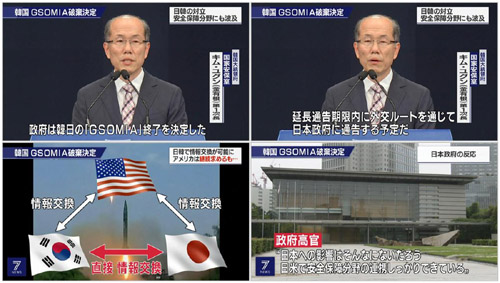by WorldTribune Staff, August 23, 2019
South Korea’s government on Aug. 22 announced that it was scrapping a military-intelligence sharing pact with Japan weeks after being urged to do so by communist North Korea.
Japan had sought an extension of the General Security of Military Information Agreement (GSOMIA) despite increased tension between the two countries. The GSOMIA had been the only agreement signed between South Korea and Japan in the military sector.

The United States saw the GSOMIA as a key component of the U.S.-South Korea-Japan strategic alliance and had pressed the liberal Moon Jae-In administration in Seoul not to cancel the intel-sharing pact.
The U.S. was said to have been caught by surprise by the Aug. 22 announcement as representatives from Seoul and Washington had discussed the GSOMIA issue earlier in the day. National Security Office (NSO) deputy head Kim You-Geun met with Stephen Beigun, the U.S. special representative on North Korea, at the central government complex in Seoul.
Deputy NSO head Kim Hyun-Chong said he discussed the matter with the White House National Security Council “every day,” adding that nine phone conversations were made between the top security offices of the two countries from July to August this year, the Korea Times reported.
“The U.S. wanted to retain the GSOMIA. And because we don’t want to see even small cracks in the military alliance between South Korea and the U.S. due to the Seoul-Tokyo trade friction, I explained to the U.S. officials about the necessity of ending the agreement. When I met senior White House officials in Washington, I stressed this point,” Kim Hyun-Chong said.
The remarks were aimed at dismissing fears that the government’s decision would weaken its military alliance with the U.S. and security cooperation in Northeast Asia.
The presidential aide’s comments came after U.S. Secretary of State Mike Pompeo said, “We are disappointed to see the decision that the South Koreans made on that information-sharing agreement.”
“The U.S. has underlined the importance of the agreement as a core instrument of trilateral security cooperation to counter North Korea’s continued provocations,” the Korea Times noted.
“We are sorry about Cheong Wa Dae’s decision. Keeping the GSOMIA was necessary for South Korea to maintain military cooperation with Japan and the United States amid the growing security challenges on the Korean Peninsula,” said Jun Hee-Kyung, a spokeswoman for the main opposition Liberty Korea Party (LKP).
Earlier this month, a North Korean propaganda outlet had called on South Korea to abandon the intel-sharing pact with Japan that was signed under former South Korean President Park Geun-Hye, Geostrategy-Direct reported on Aug. 6.
“It is rather abnormal that the agreement of betraying the country signed by Park Geun-Hye … still exists without being abrogated,” the Uriminzokkiri propaganda outlet said.
Related: North Korea to Seoul: Cancel intel-sharing pact with Tokyo, August 6, 2019
Signed in November 2016 under the Park administration, the deal had enabled Seoul and Tokyo to share confidential military information to better cope with nuclear and missile threats from North Korea.
The South, which has moved toward warming relations with the North since the election of leftist President Moon Jae-In, had been considering scrapping the deal amid an escalating trade and diplomatic dispute with Japan over wartime forced labor.
Conservative analysts and retired military officers in South Korea have charged that the Moon government is making common cause with the North against Japan at grave risk to national security which is a function of Seoul’s strategic alliance with Washington and Tokyo. The U.S. military has maintained a major presence in South Korea since the Korean War was suspended with a truce in 1953.
“South Korea tried to resolve trade friction via open dialogue; but Japan didn’t respond. Japan removed South Korea from its list of trusted trading partners without providing a clear reason as to why. These actions have resulted in a grave change in security cooperation between the two countries. Maintaining the military agreement is against South Korea’s national interests,” the NSO’s Kim said in a press briefing on Aug. 22.
South Korea’s government was outraged when, early last month, Tokyo imposed export restrictions on the export of materials crucial for Seoul’s high-tech industry.
Bilateral tension peaked when this was followed by the removal of South Korea from Japan’s whitelist of countries given preferential treatment in customs procedures due to “security concerns,” despite President Moon’s strong warning against the move, the Korea Times noted.
Intelligence Brief __________ Replace The Media
